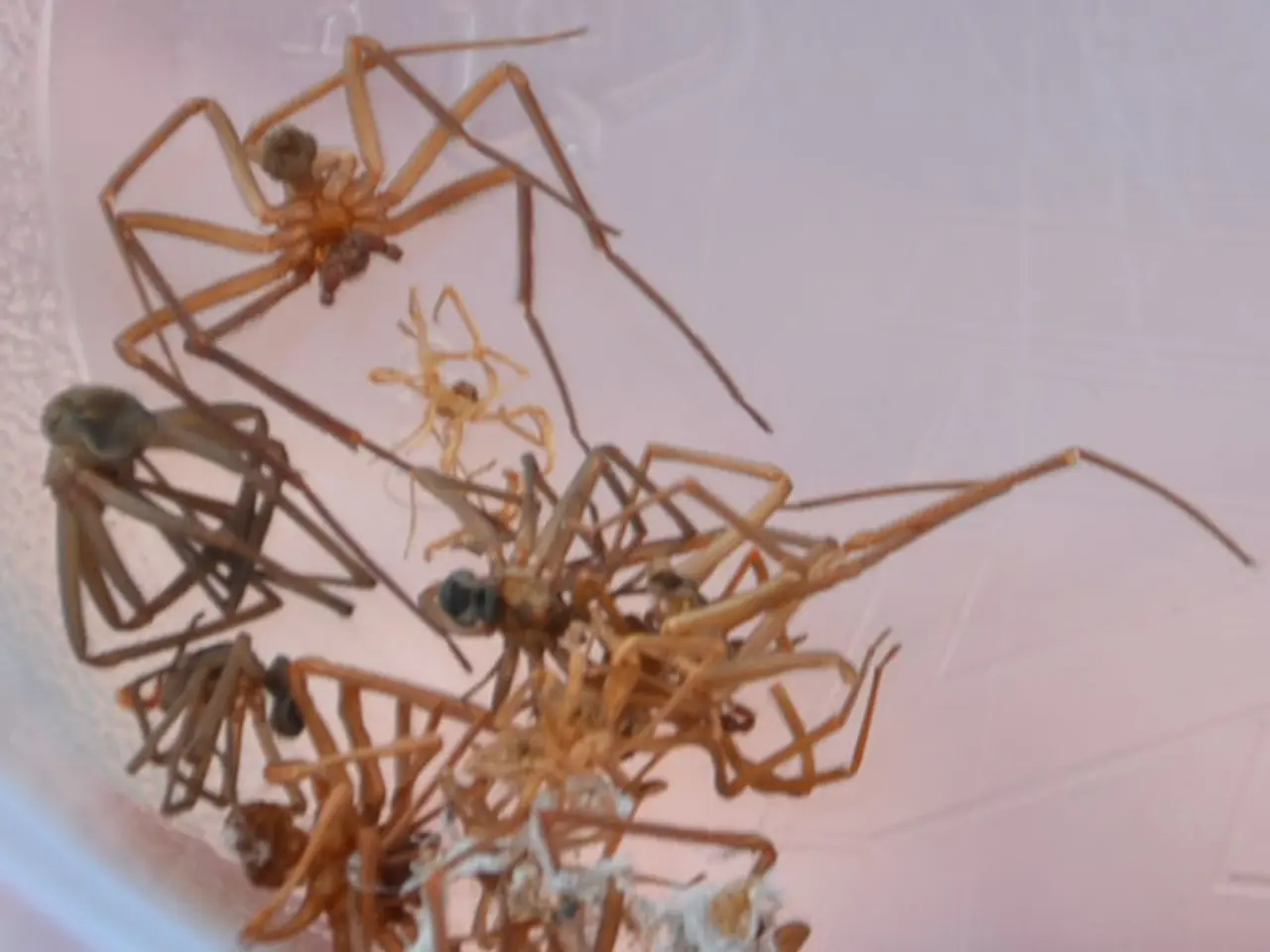Captures gruesome spectacle: Video shows 1,000 newly hatched spiders consuming their mothers and female relatives
In a groundbreaking revelation, a new five-part series from the BBC titled "Parenthood" features the cannibalistic behaviour of African social spiders (Stegodyphus dumicola) during mass migrations. Narrated by the renowned British biologist and broadcaster Sir David Attenborough, the clip presents a harsh but functional social structure that ensures the survival of the next generation.
The behaviour in question involves the cannibalization of mothers and other elder colony members when food sources are depleted. Interestingly, the spiders do not cannibalize their siblings. Instead, they turn to cannibalizing their elderly relatives, including their mothers, as a final act of survival.
A fascinating aspect of this behaviour is the mothers' intentional trembling before their deaths. Scientists believe this trembling mimics the signals that prey insects generate when caught in a web, encouraging the spiderlings to attack and consume the mother without hesitation. This trembling serves as a form of maternal sacrifice, ensuring an efficient transfer of resources from the adult spiders to the offspring.
Following the consumption of the mother, the spiderlings may continue to cannibalize other adult spiders within the colony until only the youngest generation remains. This behaviour illustrates a unique evolutionary strategy where the mothers increase the survival chances of their offspring at the cost of their own lives.
The clip, produced and directed by Jeff Wilson, shows the spiders playing a "statues" game before attacking. Wilson expressed that, while the behaviour is horrifying, it makes sense in the context of survival for the next generation.
Over 1,000 young African social spiders are seen in the video, making this a significant event in television history. The footage of this stomach-churning behaviour is the first time it has been captured on TV, according to The Guardian.
The dying spider mother's action is described as the "ultimate sacrifice" to ensure the survival of the next generation. Sir David Attenborough was both delighted and horrified by the footage, as stated by Jeff Wilson.
This brutal form of survival and resource acquisition provides vital nourishment during precarious mass migrations, enabling the new generation to sustain themselves when food is scarce. The behaviour represents an extreme form of parental care and sacrifice, promoting the colony’s future survival. After consuming the spider mother, the spiderlings continue to eat other surviving adults in the colony, leaving only the next generation.
- The world of science unveiled another intriguing finding in the field of environmental science, as a new BBC series, "Parenthood," showcases the cannibalistic behavior of African social spiders.
- In the realm of workplace-wellness and health-and-wellness, the series highlights a unique example of survival instincts, offering insights into mental health.
- The series, narrated by Sir David Attenborough, delves into the fitness-and-exercise strategies of these spiders, revealing their resilience and adaptability.
- The behavior presented in "Parenthood" is particularly relevant to the ongoing discussion about climate change, showcasing the lengths some organisms go to survive in harsh conditions.
- As part of the broader conversation on health-and-wellness, therapies-and-treatments, and aging, the series provides a stark reminder of the delicate balance between individual survival and the welfare of the collective.
- Cannibalism, a topic that often raises questions about ethics in environmental science, is presented here as an extreme form of parental care and sacrifice.
- The series also sheds light on the fascinating field of space-and-astronomy, as it highlights the remarkable adaptations exhibited by organisms during migration.
- For those interested in lifestyle, food-and-drink, and technology, the series offers a glimpse into the innovative ways nature has evolved to cope with scarcity.
- In the context of relationships, the behavior demonstrated by these African social spiders serves as a stark reminder of the sacrifices individuals may have to make in the name of survival.
- For pet enthusiasts and travelers, the series presents a captivating journey through various environments, offering valuable insights into the diverse world of arachnids and their survival strategies.




